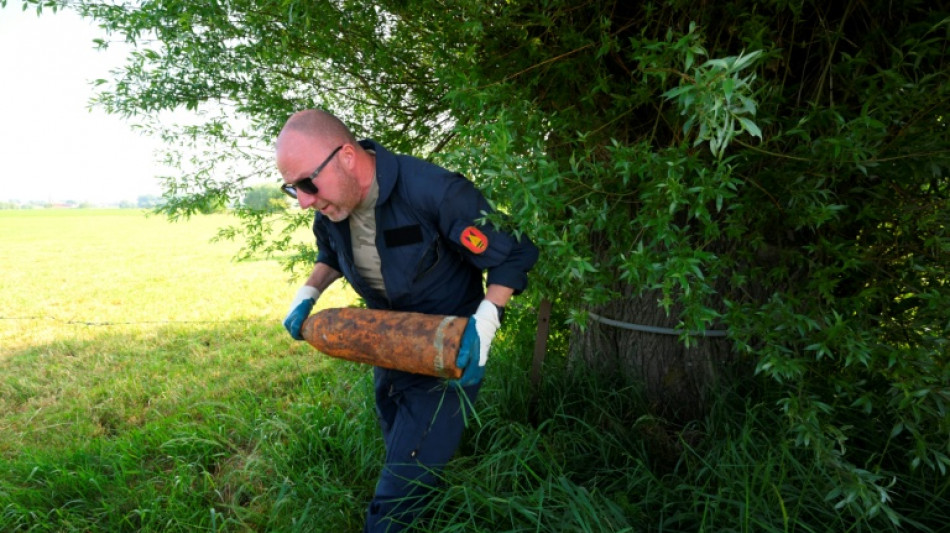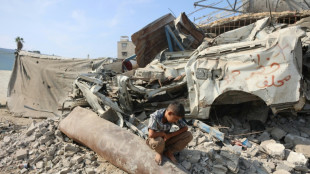
-
 England captain Itoje savours 'special' New Zealand win
England captain Itoje savours 'special' New Zealand win
-
Wales's Evans denies Japan historic win with last-gasp penalty

-
 Zelensky renews calls for more air defence after deadly strike on Kyiv
Zelensky renews calls for more air defence after deadly strike on Kyiv
-
NBA's struggling Pelicans sack coach Willie Green

-
 Petain tribute comments raise 'revisionist' storm in France
Petain tribute comments raise 'revisionist' storm in France
-
Spain on World Cup brink as Belgium also made to wait

-
 Spain virtually seal World Cup qualification in Georgia romp
Spain virtually seal World Cup qualification in Georgia romp
-
M23, DR Congo sign new peace roadmap in Doha

-
 Estevao, Casemiro on target for Brazil in Senegal win
Estevao, Casemiro on target for Brazil in Senegal win
-
Ford steers England to rare win over New Zealand

-
 Massive march in Brazil marks first big UN climate protest in years
Massive march in Brazil marks first big UN climate protest in years
-
Spain rescues hundreds of exotic animals from unlicensed shelter

-
 Huge fire sparked by explosions near Argentine capital 'contained'
Huge fire sparked by explosions near Argentine capital 'contained'
-
South Africa defy early red card to beat battling Italy

-
 Sinner beats De Minaur to reach ATP Finals title match
Sinner beats De Minaur to reach ATP Finals title match
-
Zelensky vows overhaul of Ukraine's scandal-hit energy firms

-
 South Africa defy early red card to beat Italy
South Africa defy early red card to beat Italy
-
Alex Marquez claims Valencia MotoGP sprint victory

-
 McIlroy shares lead with Race to Dubai title in sight
McIlroy shares lead with Race to Dubai title in sight
-
Climate protesters rally in Brazil at COP30 halfway mark

-
 Spike Lee gifts pope Knicks jersey as pontiff meets film stars
Spike Lee gifts pope Knicks jersey as pontiff meets film stars
-
BBC caught in crossfire of polarised political and media landscape

-
 'Happy' Shiffrin dominates in Levi slalom for 102nd World Cup win
'Happy' Shiffrin dominates in Levi slalom for 102nd World Cup win
-
Palestinian national team on 'mission' for peace in Spain visit

-
 Brazilian 'Superman' cheers child cancer patients in Ghana
Brazilian 'Superman' cheers child cancer patients in Ghana
-
India close in on win over South Africa after Jadeja heroics

-
 Huge explosions rock industrial area near Argentina's capital
Huge explosions rock industrial area near Argentina's capital
-
Bezzecchi takes pole for Valencia sprint and MotoGP

-
 Dominant Shiffrin leads after first slalom run in Levi
Dominant Shiffrin leads after first slalom run in Levi
-
Nine killed in accidental explosion at Indian Kashmir police station

-
 Climate protesters to rally at COP30's halfway mark
Climate protesters to rally at COP30's halfway mark
-
Fighting South Africa lose Rickelton after India 189 all out

-
 Harmer leads South Africa fightback as India 189 all out
Harmer leads South Africa fightback as India 189 all out
-
Prison looms for Brazil's Bolsonaro after court rejects his appeal

-
 EU bows to pressure on loosening AI, privacy rules
EU bows to pressure on loosening AI, privacy rules
-
India close in on lead despite South African strikes

-
 Curry's 49 points propel Warriors in 109-108 win over Spurs
Curry's 49 points propel Warriors in 109-108 win over Spurs
-
NZ boxer Parker denies taking banned substance after failed test

-
 Australia setback as Hazlewood ruled out of 1st Ashes Test
Australia setback as Hazlewood ruled out of 1st Ashes Test
-
Australia pace spearhead Josh Hazlewood ruled out of 1st Ashes Test

-
 UN Security Council to vote Monday on Trump Gaza plan
UN Security Council to vote Monday on Trump Gaza plan
-
Japan's Tomono leads after men's short program at Skate America

-
 China tells citizens to avoid Japan travel as Taiwan row grows
China tells citizens to avoid Japan travel as Taiwan row grows
-
Purdue Pharma to be dissolved as US judge says to approve bankruptcy

-
 Iran's first woman orchestra conductor inspires
Iran's first woman orchestra conductor inspires
-
Wood gets all-clear in boost for England

-
 Golf's world No. 8 Thomas has back surgery
Golf's world No. 8 Thomas has back surgery
-
Rebooted Harlem museum celebrates rise of Black art

-
 'Desperation in the air': immigrant comics skewer Trump crackdown
'Desperation in the air': immigrant comics skewer Trump crackdown
-
UN regulator says shipping still wants to decarbonize -- despite US threats


Deminers comb Belgian countryside for remnants of Great War
Working with the utmost care, a Belgian deminer wiggled a century-old artillery shell from the soil and deposited it safely in a sandbox in the back of his truck.
"This one's an 18-pounder -- there might be a bit of explosive left inside," said Franjo, one of a team of army specialists whose job is to comb the countryside for remnants of the Great War.
In the flat fields of northwestern Belgium, where hundreds of thousands of soldiers fell between 1914 and 1918, traces of the conflict are everywhere.
Beyond the military cemeteries -- their neat rows of tombstones stretching sometimes beyond the line of sight -- British, German and French shells and munitions are constantly turning up at the surface.
The task of tracking and removing them keeps the demining service of the Belgian army -- known as SEDEE in French, DOVO in Flemish -- busy on a daily basis.
Founded in the wake of World War I, the service concentrates its activities around the town of Langemark-Poelkapelle, north of Ypres, where it has set up base.
Each year its teams respond to more than 2,000 requests from farmers or construction crews to remove munitions -- some spent, but others still live -- after turning the soil to sow crops or lay foundations for a new home.
Once removed, the team determines how dangerous the munitions are -- and based on that how to dispose of them, either detonating them outside, or burning them in an oven.
"We destroy 200 to 250 tonnes every year," Jacques Callebaut, head of public relations for the deminer service, told AFP.
On this morning near Ypres, it took the team under an hour to scoop up a dozen shells and grenades -- snaking along little country roads with their small truck.
Franjo -- who asked to be identified by first name only -- and his two teammates navigate with the help of a small pile of printed police emails, mapping all the spots where potential explosives have been flagged.
- 'An added danger' -
Sometimes landowners try to make their work easier by setting out the shells to be collected from the roadside.
The deminers themselves wear thick gloves to handle the rusted relics, which can potentially contain white phosphorus, arsenic or mustard gas -- a chemical weapon causing skin blistering also known as yperite because of its use near Ypres in World War I.
"Around 60 percent of the munitions we find contain an explosive load, and around 10 to 30 can also be toxic, which brings an added danger," Callebaut said.
When in doubt, they rely on technology -- peering inside the shell with X-rays to spot a smoke cartridge, or using a neuron spectrometer to analyse its various materials.
Belgium's deminers have built up a degree of expertise that other countries have come to rely on.
"We handle the toxic munitions found in The Netherlands, and a few weeks ago we were called to neutralise a bomb in Norway as they didn't have the equipment to do so," Callebaut said.
At the crossroads of the Germanic, French and British empires, Belgium has been a key battlefield since the European Middle Ages -- and famously saw Napoleon's French army defeated by the British at Waterloo, in 1815.
It was heavily hit by the two world wars of the 20th century -- but it was the first that left by far the most traces in the land.
"World War II shells only turn up from time in time, in cities that came under bombardment," said Corentin Rousman, a Belgian historian.
Near Ypres, by contrast, "there was a static front line for four years, with millions of shells on either side," he said.
K.AbuTaha--SF-PST



